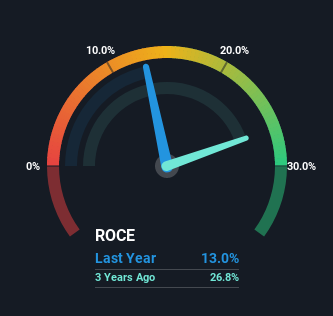Apex Frozen Foods (NSE:APEX) Could Be Struggling To Allocate Capital
Finding a business that has the potential to grow substantially is not easy, but it is possible if we look at a few key financial metrics. Firstly, we'd want to identify a growing return on capital employed (ROCE) and then alongside that, an ever-increasing base of capital employed. If you see this, it typically means it's a company with a great business model and plenty of profitable reinvestment opportunities. In light of that, when we looked at Apex Frozen Foods (NSE:APEX) and its ROCE trend, we weren't exactly thrilled.
What is Return On Capital Employed (ROCE)?
If you haven't worked with ROCE before, it measures the 'return' (pre-tax profit) a company generates from capital employed in its business. To calculate this metric for Apex Frozen Foods, this is the formula:
Return on Capital Employed = Earnings Before Interest and Tax (EBIT) ÷ (Total Assets - Current Liabilities)
0.13 = ₹631m ÷ (₹7.1b - ₹2.3b) (Based on the trailing twelve months to December 2021).
So, Apex Frozen Foods has an ROCE of 13%. That's a pretty standard return and it's in line with the industry average of 13%.
View our latest analysis for Apex Frozen Foods

Historical performance is a great place to start when researching a stock so above you can see the gauge for Apex Frozen Foods' ROCE against it's prior returns. If you want to delve into the historical earnings, revenue and cash flow of Apex Frozen Foods, check out these free graphs here.
How Are Returns Trending?
In terms of Apex Frozen Foods' historical ROCE movements, the trend isn't fantastic. To be more specific, ROCE has fallen from 33% over the last five years. Although, given both revenue and the amount of assets employed in the business have increased, it could suggest the company is investing in growth, and the extra capital has led to a short-term reduction in ROCE. And if the increased capital generates additional returns, the business, and thus shareholders, will benefit in the long run.
On a related note, Apex Frozen Foods has decreased its current liabilities to 32% of total assets. That could partly explain why the ROCE has dropped. What's more, this can reduce some aspects of risk to the business because now the company's suppliers or short-term creditors are funding less of its operations. Some would claim this reduces the business' efficiency at generating ROCE since it is now funding more of the operations with its own money.
In Conclusion...
Even though returns on capital have fallen in the short term, we find it promising that revenue and capital employed have both increased for Apex Frozen Foods. In light of this, the stock has only gained 2.3% over the last three years. Therefore we'd recommend looking further into this stock to confirm if it has the makings of a good investment.
Since virtually every company faces some risks, it's worth knowing what they are, and we've spotted 2 warning signs for Apex Frozen Foods (of which 1 makes us a bit uncomfortable!) that you should know about.
For those who like to invest in solid companies, check out this free list of companies with solid balance sheets and high returns on equity.
New: Manage All Your Stock Portfolios in One Place
We've created the ultimate portfolio companion for stock investors, and it's free.
• Connect an unlimited number of Portfolios and see your total in one currency
• Be alerted to new Warning Signs or Risks via email or mobile
• Track the Fair Value of your stocks
Have feedback on this article? Concerned about the content? Get in touch with us directly. Alternatively, email editorial-team (at) simplywallst.com.
This article by Simply Wall St is general in nature. We provide commentary based on historical data and analyst forecasts only using an unbiased methodology and our articles are not intended to be financial advice. It does not constitute a recommendation to buy or sell any stock, and does not take account of your objectives, or your financial situation. We aim to bring you long-term focused analysis driven by fundamental data. Note that our analysis may not factor in the latest price-sensitive company announcements or qualitative material. Simply Wall St has no position in any stocks mentioned.
About NSEI:APEX
Apex Frozen Foods
Engages in the farming, processing, production, and sale of shrimps in India.
Flawless balance sheet with reasonable growth potential.
Similar Companies
Market Insights
Community Narratives




